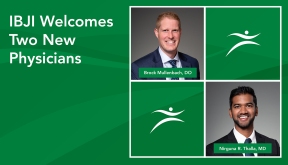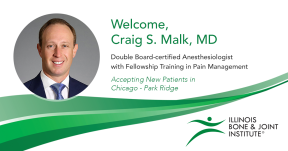Q&A with Jacob Babu, MD, MHA
What Is a Lumbar Disc Herniation?
Dr. Babu: It is a common presenting condition that is the result of multiple factors. Usually, an already predisposed disc is stressed by physical activity. This frequently consists of lifting events with compromised mechanics. It’s usually a combination of two motions that lead to a herniation: flexion or bending at your hip and a twisting motion at the same time. It can be oftentimes confused with a muscular strain in the back, which can also have a similar offending mechanism.
What Are the Symptoms of Lumbar Herniation?
Dr. Babu: Patients can have the very nonspecific symptom of low back pain as their presenting complaint. Sometimes, if the disc herniation is large enough that there is compression of a nerve root, this can produce symptoms such as radiating leg pain, numbness, or weakness.
At What Point in Life Does Lumbar Disc Herniation Occur?
Dr. Babu: Lumbar disc herniation generally starts in the fourth or fifth decade of life. Your discs become more vulnerable when they have degenerated, which happens inevitably with age. There is also a genetic component of disc degeneration which puts us all at different risk. About 10 percent of people suffer from it and about five percent become symptomatic in their lifetime. It’s more common in males than females.
What Type of Activities Can Put You at Risk for a Lumbar Disc Herniation?
Dr. Babu: Disc herniations are commonly seen with heavy lifting activities. It is a common cause of work-related injuries. It has even been seen in scenarios with violent sneezing.
Are Certain Professionals More at Risk for Lumbar Herniation?
Dr. Babu: Movers, construction workers and other manual laborers are at high risk for disc herniation due to the physical, sometimes unpredictable, nature of their work.
Does Having Sciatica Pain Mean You Have Lumbar Herniation?
Dr. Babu: The nerves in your lumbar spine combine to form your sciatic nerve which provides much of the function of your lower extremity. Sciatica is a general term for irritation to any of these nerves which results in radiating pain down the buttocks or back of the leg. This can often be caused by disc herniations.
How Can People Avoid a Lumbar Herniation?
Dr. Babu: It’s really all about focusing on good form and mechanics. Emphasizing knee flexion when performing activities requiring ground-level tasks is paramount. Minimize bending so that your back is never parallel to the ground. Focus on flexibility of your lower extremities and back (hamstring, hips/pelvis and lower back) as well as ensure that your core is strong and capable.
What Can Be Done to Avoid Disc Degeneration?
Dr. Babu: There is a lot of ongoing research on biologics that can potentially reverse the process of disc degeneration, however, no solution has currently been derived. There’s nothing we can really do to slow down the degeneration other than maintaining good body weight as well as partaking in good healthy spine habits. Refraining from injuring yourself and using your legs and activating your core to lift are some of the key controllable factors.
How Do You Treat Lumbar Herniation?
Dr. Babu: Anti-inflammatory medications are important for treating symptomatic lumbar disc herniations. The herniated disc itself can produce an inflammatory event responsible for its symptoms, so medications like ibuprofen or even a course of steroids can resolve a fair amount of one's symptoms. After you have a disc injury, you should refrain from heavy lifting, bending over, and twisting to allow your body to heal on its own.
What If It Does Not Resolve?
Dr. Babu: Most patients won’t need surgery as their symptoms will resolve with medication and physical therapy, but in cases where symptoms are severe and lasting you may benefit from a more invasive intervention. If you don’t have significant weakness or numbness, an epidural injection may be a good place to start. If you have tried this, or if your symptoms are severe, a small decompression procedure may be right for you.
What Are the Surgical Options for an Unresolved Lumbar Disc Herniation?
Dr. Babu: Patients may undergo a discectomy procedure, a targeted approach to remove the disc herniation that is causing nervous compression. There are multiple ways to do this procedure through a mini-open approach, with a microscope (microdiscectomy), or even through a camera-assisted endoscopic process.
What Is the Success Rate?
Dr. Babu: The success rate for decompression surgery is in the high 80-90 percent range. There is a small risk of re-herniation; one to six percent of patients in the initial recovery period can develop a recurrent disc herniation. To minimize this, most surgeons will request their patients refrain from bending, lifting, or twisting after the surgery for a short period of time.
What Can Patients Expect from an Office Visit?
Dr. Babu: I’m happy to see anyone who has back pain or concern for disc herniation. The initial appointment would involve assessing the condition, evaluating for neurologic deficits, and identifying an appropriate treatment plan. We begin by recommending conservative options including anti-inflammatory medication and determining if and when physical therapy is appropriate. In the rare situation where a lumbar disc herniation presents with severe nerve damage, urgent surgical decompression may be recommended. It is always good to bring any imaging studies that a patient has already completed for the specialist to evaluate.
Next Steps
Feeling low back pain? If you would like to be evaluated, you can Schedule online with an IBJI physician who can help you with a diagnosis and treatment plan to get you back to feeling your best.



.jpg)
